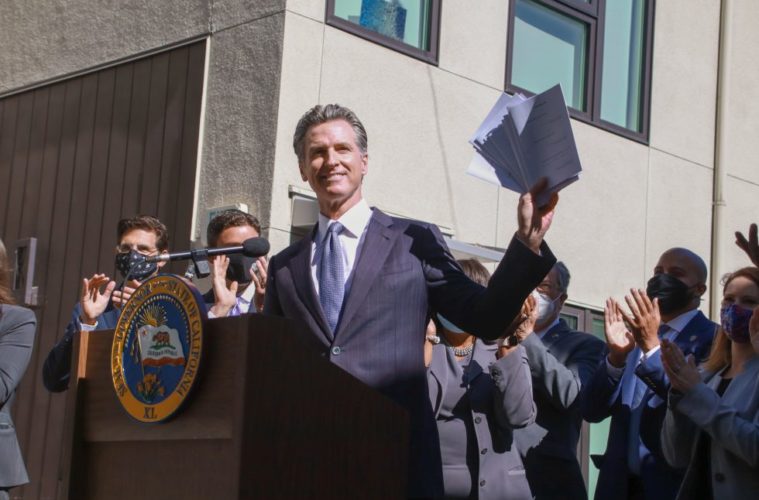Following Tuesday night’s big news about no more mandatory minimum sentences for nonviolent drug offenders, Governor Gavin Newsom has approved three more bills that will have an impact on both of the state’s cannabis markets: regulated and unregulated.
The first big bill, AB-1138, addresses civil enforcement around unlawful cannabis activity. Under the newly enacted law, a person engaging in commercial cannabis activity without a license will be subject to civil penalties of up to three times the amount of the license fee for each violation. Each day the offender is in operation will be considered a separate violation of this section. Anyone caught aiding and abetting the operation will face the same fine.
The CA government will use the money from the above fines to reimburse the Attorney General’s office or the city or county attorney that investigates each individual offender. If the city has more than 750,000 residents the case will automatically go to the Attorney General.
And this is all separate from any criminal penalties the unlicensed operators.
We reached out to one of California’s OG cannabis activists, California NORML Deputy Director Ellen Komp, to get her take on the set of bills and more. When it came to AB-1138, Komp emphasized these triple-rate license fines were finable for up to three years.
“I don’t like this bill but it seems some in the industry do,” Komp told L.A. Weekly.
The next law to receive the Governor’s signature was AB-1222, which regulates the packaging around the booming cannabis beverages space. The new law states what is already the fairly standard: everything needs to be labeled and placed in a tamper-evident, child-resistant package and include everything needed for the state’s track and trace program.
Komp didn’t have any objections to the language in the bill and noted beverages are an expanding market.
The last bill, one that will have the biggest impact on the THC-heavy cannabis industry, is SB-544. The bill would require the Department of Cannabis Control to establish a standard cannabinoids test method by January 1st, 2023.
This would mean the wild west of cannabis testing would see standardized operating procedures they would be mandated to use, as opposed to whatever tweaks the THC numbers the highest.
Standardizing the way pot is tested would mean the labs would be creating value in a different way than they do now. Are there people that got into the game because they are weed nerds and really wanted to spend their days in a lab with pot? Sure. But there were also those of a shadier class.
The latter will likely use every moment they can before New Year’s Eve 2022 to make the numbers as appealing as possible to their customer as the lack of education to consumers about terpene content continues to see the market chasing 30% and above test results.
Once everyone is playing by the same rules, labs will be more of a “value” thing than a “shop around for THC numbers” thing, presuming there is enforcement.
We reached out to one of the state’s oldest labs to get their take on the bill.
“We like the intent of the bill, to standardize THC values across the industry. However, we believe that the minority of labs that are inflating THC values will still be able to get away with doing so even with a standardized method while the rest of the labs will have their hands tied with regard to innovation and method improvement,” SC Labs Founder Josh Wurzer told L.A. Weekly, “We’d like to see the reference lab focused on surveillance activities to identify any labs that are putting out bad data rather than forcing the entire industry into a single method.”
Komp noted CA NORML was down for better testing standards and that the recent progress on hemp in Sacramento was also noteworthy.
“The bigger news, I think, is the signing of AB-45, allowing industrial hemp or cannabinoids, extracts, or derivatives from industrial hemp as an ingredient in dietary supplements, foods, beverages, cosmetics, or pet foods,” Komp said, “We objected to the ban on smokable hemp, which was removed, but only once it’s taxed.”
Komp Closed noting there was still no word on AB-1302, a bill allowing cannabis billboards in CA under certain restrictions. But a couple of hour later Newsom ended up vetoing it. He cited not wanting to weaken the protections voters approved in Prop 64.
Advertising disclosure: We may receive compensation for some of the links in our stories. Thank you for supporting LA Weekly and our advertisers.

